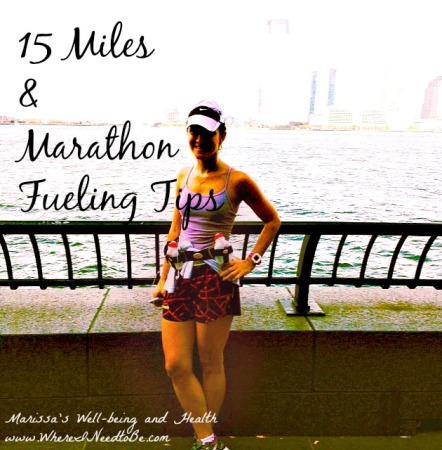If you’re a regular here, you know that I’m training for the TCS New York City Marathon.
(Yes, that’s me looking like a post-long run mess in the picture) …
Training for this started slower than I would have liked while I was also training for the Norwalk Triathlon. Following the tri I could finally focus only on marathon training, things felt good and I was excited!
Then Labor Day weekend happened and we were visiting my family in Louisville. We had a 13 mile long run scheduled that weekend with 90 degree temps and off-the-charts humidity.
That run destroyed me.
I brushed myself off and by the time my 11 miler rolled around the following weekend I had high hopes that it couldn’t be much worse.
Well, it was, and I couldn’t figure out why.
That’s the thing about training. It’s practice for the real thing and there are so many elements that go into a successful race: fuel, hydration, mindset, clothing, weather, rest, and on and on.
With two mediocre long-ish runs in a row under my belt, I was having doubts about running the marathon at all.
Could I really do it considering those runs weren’t even that long and I was already suffering and most importantly, did I want to?
But like with anything else I took it day by day and by the end of the week was gearing up for a 15 mile run.
David and I both ended up having the best long run we’ve ever had that weekend. And again this past weekend with a scaled back 12 miles.
These past two long runs have restored my faith in my ability to run 26.2.
And at 38 days away, things are getting serious.
Last night we went to a seminar on nutritional and mental preparation for the marathon at New York University Langone Center for Musculoskeletal Care. The seminar addressed fueling, hydration and mental preparation for the marathon.
As I recap my final three long runs over the next few weeks, I’ll be sharing a few of the tips from the night.
Marathon Fueling Tips from Registered Dietician, Andrea Chernus
SO so much I’d like to share, but here are the best and most helpful tips from the night:
- Eat too few carbs and you risk injury, persistent soreness and your body will burn protein for energy
- Your body can typically only use 20-30 grams of protein at once so eat 3-4 ounces of protein at each meal
- In the weeks leading up to the marathon, practice how you will be eating (food before running, breakfast on marathon day, fueling during truing and recovery after long runs)
- Your pre-run snack is meant to top the tanks. If you’re a morning runner, your body is actually using the previous day’s lunch and dinner as fuel
- The closer to the run, the purer in carbohydrates your fuel should be
- During the run, you should take in 30 – 60 grams (for some people it can be up to 80 grams) of carbohydrate per hour in the form of gels, sports drink and/or solid food
- Recovery is most important after a long run to replace energy stores, repair muscle tissue, prevent soreness and get you ready for your next workout
- Eat a recovery meal of mostly carbs and a little protein 15 – 3o minutes after your run (if you’re not hungry, use a recovery beverage)
- Repeat in two hours and have a meal which includes more protein (Note: If your recovery meal is actually a meal and not a snack, you can increase the protein ratio)
- A week before the marathon, increase your carbohydrate intake; you should gain some weight
- The day before the marathon, your larger meal should be lunch or breakfast and all food should be familiar
- On race day, the last time you eat is different than the last meal you eat; you’ll likely have breakfast several hours before the race and then a pre-race snack
- Fueling during the race should start 45 minutes in
- After the race, you’ll want to have a recovery snack and a meal. Focus on eating nutrient rich foods that are high in antioxidants since marathons tax your immune system, you’ll want to do everything you can to stay healthy post-marathon




sinfulnutrition I am foam rolling even though I can’t stand it. eek! Yoga has been hard for me to fit in. I’m looking forward to going back to more of it AND more strength training after this race!
I’m training for my first half in November and am trying to be good about recovering with foam rolling and yoga aside from good nutrition. Thanks for the tips!